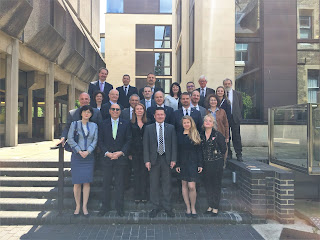SEESOX co-sponored a conference in Athens on Friday 5 and Saturday 6 April, 2019 at Deree – The American College of Greece. The two-day conference was co-organized by University of Sheffield, University of Exeter, SEESOX, University of Peloponnese, and hosted by The American College of Greece and its Institute of Global Affairs.
Report by Kostis Kornetis
The conference entitled “Greek Social Movements between past and present”, held at DEREE College, Athens, April 5-6, 2019 brought together social scientists, psychologists and anthropologists to discuss grassroots mobilisation in Greece on left and right from 1974 to the present day. It was co-organised by the University of Sheffield, Pierce DEREE Institute, SEESOX, the University of Exeter and the University of the Peloponnese.
The first panel, on “The past and present concept”, adopted a long-term perspective, looking at longer stretches of time to understand current political attitudes, using different approaches and tools: political science, memory studies and social psychology. Marilena Simiti gave a comprehensive story of social activism in Greece between 1974 and 2015, looking at various cycles of protest and changes over time, including a growing transnationalisation of protest, a growing fluidity and heterogeneity of collective identities and non-state centric forms of action. Through an analysis of the student, feminist, ecological, antiglobalisation and square movements, she looked at protest complementing electoral policies. Beginning from the post-junta student movements (bearing the influence of the political parties of the time) the paper ended up with the squares in 2011 that signified a waning of the left-right cleavage and the emergence of a new division between memorandum and anti-memorandum. Eirini Karamouzi and Lamprini Rori combined history with quantitative political science in a longitudinal analysis – in the context of framing theory. The paper brought original questions to the field of anti-Americanism, including how anti-Americanism was linked to pro-Sovietism or pro-Russianism, whether belonging to the Right or Left made a difference, whether party affiliation played a role, and to what extent collective memory over critical events is a driver to adopting an anti-American stance. The paper showed that whereas anti-Americanism was party specific or Left specific until 1993, from then on until 2005 it became widespread. It also argued that collective memory about the past is fading over time. Lastly, the paper by Nikos Takis, Angeliki Skamvetsaki and Vilma Papasavva used tools connected to psychoanalysis and trauma analysis to test the applicability of psychoanalytical theory on the Greek civil war and transgenerational trauma transmission. The paper argued that a resurgence of past trauma occurred during the economic crisis years, boosted and instrumentalised to a large extent by SYRIZA, which insisted on the presence of the memory of the 1940s, using past symbols and frames to polarise.
 On 6 June, in St Antony’s College, Oxford, SEESOX hosted its annual lunch for the Ambassadors of the countries of South East Europe posted in London: the seventh such gathering. A number of topical issues affecting the region were discussed.
On 6 June, in St Antony’s College, Oxford, SEESOX hosted its annual lunch for the Ambassadors of the countries of South East Europe posted in London: the seventh such gathering. A number of topical issues affecting the region were discussed. 


